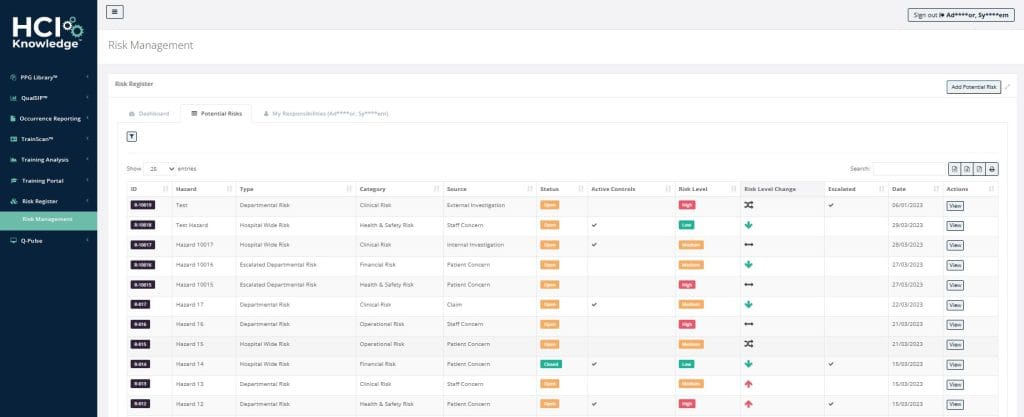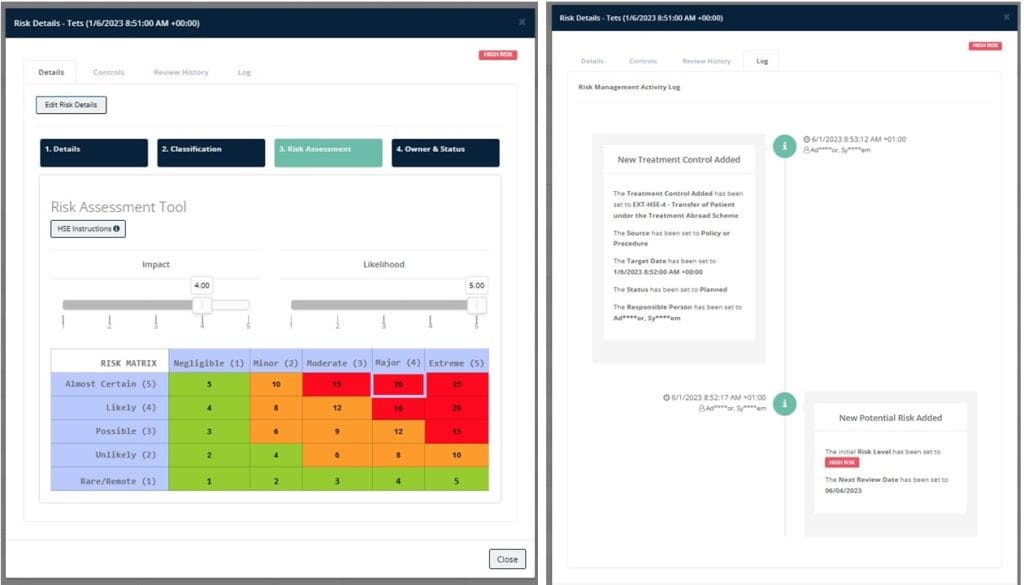Risk Management in Nursing Homes

Introduction
Nursing homes play a critical role in providing care and support to the elderly, and vulnerable individuals. As such, Registered Providers have a responsibility to ensure the well-being, safety, and quality of life of their residents. However, risk management in nursing homes is a complex and ongoing process. It is essential that an effective risk management framework is in place to help nursing homes proactively identify, assess, and mitigate potential risks, thereby creating a safer environment for both residents and staff.
In this blog will delve into the importance of risk management in nursing homes, the key challenges they face, and strategies to enhance resident safety and quality of care.
Understanding Risks in Nursing Homes
Nursing homes face a wide range of risks from corporate risks, health and safety risks, care and service provision risks and individual resident risks. Some common risks include:
- Falls: Elderly residents are at a higher risk of falling, which can lead to injuries, fractures, and other complications.
- Medication Errors: Administering the wrong medication or incorrect dosage can have serious consequences.
- Infections: As nursing homes are congregated settings, they are at higher risk of infections.
- Abuse and Neglect: Residents may experience physical, emotional, or financial abuse, or be neglected.
- Resident Absconsion: Residents may wander and become disoriented, posing a risk to their safety.
- Dietary Issues: Providing proper nutrition and hydration is essential to maintaining residents’ health.
Strategies for Effective Risk Management in Nursing Homes
Risk management is a process of clearly defined steps which support better decision making by providing a greater insight into risks and their impacts. It is a key element of good governance and underpins the ability to provide safe and effective care and supports to residents. Nursing homes should integrate risk management practices into existing work practices and oversight mechanisms, rather than viewing risk management as an isolated operation. Below are some areas of consideration to support an effective risk management framework:
- Comprehensive Assessments: Conduct thorough assessments of each resident’s medical, physical, and psychological needs to tailor care and risk management plans accordingly.
- Staff Training: Invest in ongoing training for staff, covering topics like infection control, medication administration, resident’s rights, safeguarding and protection of vulnerable adults, fire safety, person centred care planning, managing behaviour that is challenging and palliative and end of life care.
- Fall Prevention Programs: All residents must be assessed for their risk of falls upon admission and on an ongoing basis. Develop personalised fall prevention plans and make environmental adjustments to reduce the risk of falls. It is also important to provide residents with information and advice to reduce the risk of falls, based on their assessed risk.
- Infection Control: Develop robust infection control protocols in line with the requirements of the National Standards for Infection Prevention and Control in Community Services and best practice in general. Services must ensure all staff adhere to them rigorously and apply infection prevention and control as part of everyday practice. Regular vaccination programs can also help prevent the spread of infectious diseases.
- Medication Safety: Resident medication should be monitored and reviewed according to evidence-based practice, staff should be appropriately trained on medication administration and medication safety, and where medication errors do occur these should be reported and managed correctly.
- Abuse and Neglect Prevention: The nursing home must implement a ‘No Tolerance’ approach to any form of abuse and promote a culture which encourages residents, and their representatives, to raise safeguarding concerns. If concerns or issues are raised, them through investigations must be conducted.
- Emergency Preparedness: Develop and regularly update emergency preparedness plans, considering factors such as fire, chemical spills, medical emergency, natural disasters, outbreaks, utility failures, criminal incidents and IT failure.
- Reporting of Incidents: Incidents are a valuable took to identify risks. Services must identify, record, investigate, report and learn from serious incidents or adverse events. These learnings should be shared amongst staff to reduce the risk or reoccurrence.
- Fire Safety: The residential home must acknowledge the threat of fire to life causing death, disability, or illness. Consequently, the nursing home must prioritise the provision of a safe environment and workplace for all individuals with the development of an annual Fire Safety Management Programme. All staff members must be aware of fire prevention measures and take appropriate precautions.
- Absconsion: To prepare for the possibility of absconsion, the residential home should maintain a resident absconsion plan to define roles and responsibilities in the event of a resident wandering or absconding. The residential home must regularly assesses the resident’s propensity to wander, even in residents who may not appear capable of wandering or elopement, and take proactive measures to protect these residents.
- Nutrition: Residents should be assessed at admission and on a regular basis thereafter, to determine their nutritional status and risk of malnutrition. All residents must be provided with nutritious and varied diets that are appropriate for their needs.
- Regulatory Compliance: Stay informed about regulatory changes and ensure that the facility complies with all relevant regulations, standards and best practice guidance.
- Continuous Improvement: Encourage a culture of continuous improvement, where staff and management work collaboratively to identify areas for enhancement and implement necessary changes.
The Benefits of an Electronic Risk Register
An electronic risk register is a valuable tool that will support good governance and help your Nursing Home identify, assess, and proactively manage risks across the service or a Group.
As everyone has a role to play in risk management, it is important that Registered Providers support staff by providing a simple solution that makes it easy for staff to record and manage their risk responsibilities. This in turn provides the Management Team with centralised oversight of risks and allows for informed decision making.
An electronic risk register, such as HCI’s Risk Register Portal, provides you with an easily accessible, online database to record and effectively manage identified risks. Users can record and view risks for department level or organisational wide.
The register collects key details, including the type of risk, the risk category, the source, the current status, the risk level, escalation status, and the date. Staff can manage risks, conduct risk assessments and assign controls to mitigate the risk. The Risk Register also provides a simple search functionality so staff can view risks as well as their risk responsibilities.


Conclusion
Nursing homes have a profound responsibility to provide safe, high-quality care to their residents. Effective risk management is a critical component of fulfilling this responsibility. By recognising the unique risks involved, addressing the challenges, and implementing comprehensive strategies, nursing homes can create a safer and more fulfilling environment for their residents. Implementing an electronic Risk Register is an excellent tool used to manage the risks throughout a nursing home, particularly in a Group where there are many risks to manage across a number of homes. HCI’s Risk Register will give you clear oversight to support the effective management of risks and make informed decisions.
At HCI we help providers of health and social care make intelligence driven decisions to attain, manage and improve quality, safety and regulatory compliance. We have almost two decades of experience helping health and social care providers to implement robust Risk Management Frameworks. We can conduct risk assessments, support the development of risk registers, conduct risk audits and provide risk management training to ensure staff have the appropriate knowledge and skills.
If you would like further information on our Risk Management Supports, contact HCI at +353 (0)1 629 2559 or email info@hci.care.